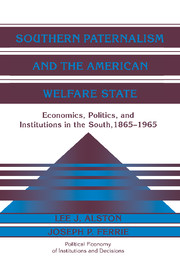Using institutional economics, Professors Alston and Ferrie show how paternalism in Southern agriculture helped shape the growth of the American welfare state in the hundred years following the Civil War. It was an integral part of agricultural contracts prior to mechanization. Paternalism involved the exchange of 'good and faithful' labour services for a variety of in-kind services, most notably protection from physical violence. The Southern landed elite valued paternalism because it reduced monitoring costs and turnover. Workers valued paternalism because of the lack of civil rights. In order to maintain the value of paternalism to their workers, the agricultural interests needed to prevent meddling from the federal government, which they accomplished through their disproportionate political power. Only the advent of mechanization and complementary technology in the late 1950s and early 1960s finally reduced the desire of Southern agricultural interests to fight the expansion of federal welfare programmes.
• Uses institutional economics to show the interaction among politics and institutions • Interdisciplinary approach will be of interest to economists, political scientists, historians and sociologists • Focuses on the forces that hindered the growth of the welfare state and the disappearance of those forces during the 1960s
Contents
Preface; Introduction; 1. The economics of paternalism; 2. The politics of maintaining paternalism; 3. Southern opposition to the Social Security Act; 4. Southern opposition to the farm security administration; 5. The Bracero program and wartime farm labour legislation; 6. Mechanization and the disappearance of paternalism; Conclusion; References; Index.


